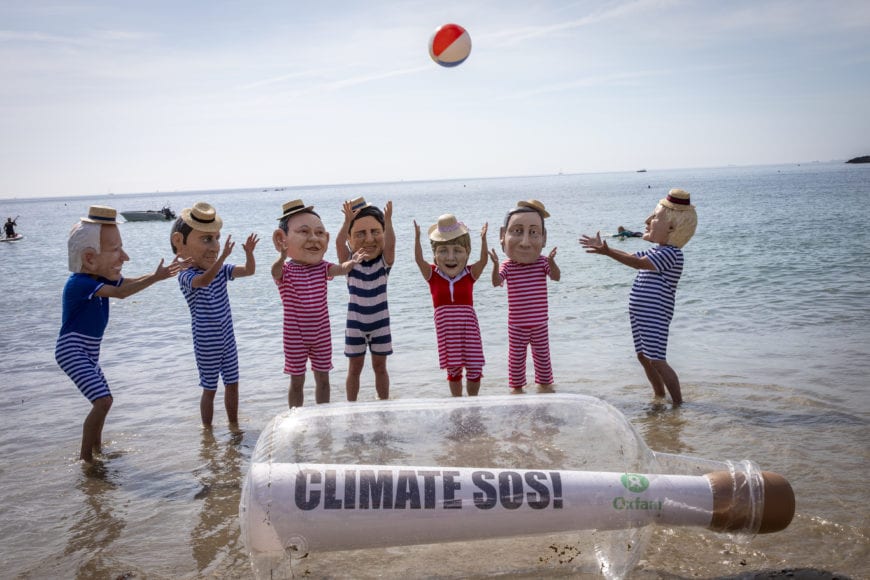

Oxfam campaigners pose as G7 leaders on Swanpool Beach near Falmouth
Max Lawson, Head of Inequality Policy at Oxfam, said:
“This G7 summit will live on in infamy. Faced with the biggest health emergency in a century and a climate catastrophe that is destroying our planet, they have completely failed to meet the challenges of our times. Never in the history of the G7 has there been a bigger gap between their actions and the needs of the world. In the face of these challenges the G7 have chosen to cook the books on vaccines and continue to cook the planet. We don’t need to wait for history to judge this summit a colossal failure, it is plain for all to see.”
Vaccines
“Today the G7 leaders have failed to protect millions of people from the deadly threat of COVID-19. They say they want to vaccinate the world by the end of next year, but their actions show they care more about protecting the monopolies and patents of pharmaceutical giants.
“A billion vaccine doses would have been a drop in the bucket, but they didn’t even manage that. Sharing vaccines will only get us so far – we need all G7 nations to follow the lead of the US, France and over 100 other nations in backing a waiver on intellectual property. By holding vaccine recipes hostage, the virus will continue raging out of control in developing countries and put millions of lives at risk.
“Prime Minister Johnson and Chancellor Merkel are insisting on defending the monopolies of pharmaceutical companies over people’s lives, which is completely inexcusable.
Special Drawing Rights
“We welcome the new proposal for rich countries to reallocate $100 billion of their Special Drawing Rights to lower-income nations. This will help to even up the mammoth disparity between how much rich and poor nations will be allocated. The additional finance is desperately needed, but it is vital that it is provided as additional to existing aid targets and on grant-like terms instead of loans. Otherwise it risks exacerbating the debt situation that is overwhelming many countries.”
Climate
“It is unacceptable that most of the G7 missed the opportunity to make new pledges of climate finance. Developing countries were looking for progress on this front ahead of landmark climate talks in Glasgow. Vague promises of new financing for green development projects should not distract from this goal.
“Today’s announcement represents new calculations of old pledges to cut emissions. We will be watching closely whether G7 countries bring forward new targets in the coming months. We need to see a Herculean effort to cut emissions further and faster, and to hit the long-overdue target of $100 billion per year in climate finance, with half of this amount for adaptation.”
/Ends
To arrange an interview with an Oxfam spokesperson contact:
David Bull | Oxfam Aotearoa | [email protected]





